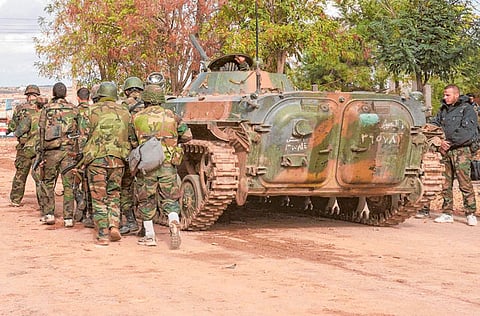Suspected N.Korea missile parts seized
China, South Korea investigating the seizure

UNITED NATIONS: A shipment of graphite cylinders usable in a missile programme and suspected to have come from North Korea was found in May aboard a Chinese ship en route to Syria in what appears to have been a violation of UN sanctions, diplomats said on Tuesday.
South Korean officials seized the shipment of 445 graphite cylinders, which had been declared as lead piping, from a Chinese vessel called the Xin Yan Tai, UN Security Council diplomats told Reuters on condition of anonymity.
South Korean authorities stopped the ship at the South Korean port of Busan, the envoys said, adding that the cylinders were intended for a Syrian company called Electric Parts.
South Korean officials briefed the Security Council’s North Korea sanctions committee about the seizure on October 24, the envoys said, and China had offered to help investigate the circumstances surrounding the incident.
“It appears the cylinders were intended for Syria’s missile programme,” a diplomat said. “China assured us they will investigate what looks like a violation of UN sanctions.”
Another diplomat said: “It’s possible that the crew of the Chinese ship had no idea what this shipment really was. It’s good that China’s expressed a willingness to investigate.”
Chinese Foreign Ministry spokesman Hong Lei said that China strictly followed UN resolutions and its own non-proliferation export controls.
“China will handle behaviour that violates relevant UN. Security Council resolutions and China’s laws and regulations according to the law,” he told reporters in Beijing.
Diplomats said the graphite cylinders appeared to be consistent with material usable in a ballistic missile programme and that South Korea would be jointly investigating the case with China.
The shipment to Syria was arranged by a North Korean trading company, diplomats said. One diplomat said the Syrian company that was to have received the cylinders may be a subsidiary of the North Korean trading firm.
North Korea is barred from importing or exporting nuclear and missile technology under UN Security Council sanctions imposed on Pyongyang because of its nuclear tests in 2006 and 2009.
There are US and European Union sanctions on Syria, but no UN arms embargo against the government of Syrian President Bashar AlAssad, who has led a 20-month military campaign against an increasingly militarized opposition.
Russia and Iran have been Al Assad’s main arms suppliers.
Earlier this year, the Security Council’s Panel of Experts on North Korea, a group of independent experts that monitors compliance with the UN sanctions regime, said it was investigating reports of possible weapons-related deals between Pyongyang and Syria as well as Myanmar.
“The DPRK (North Korea) continues actively to defy the measures in the (UN sanctions) resolutions,” the panel said in May.
– REUTERS



